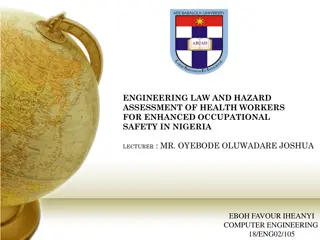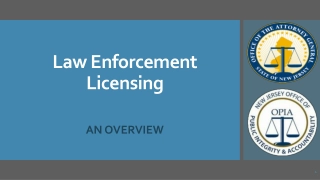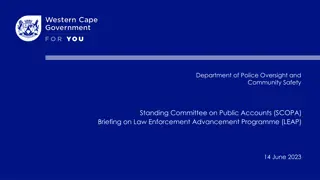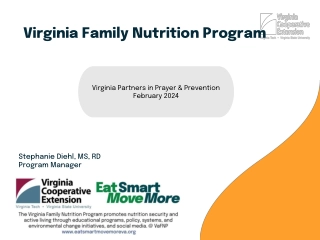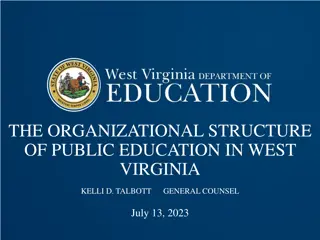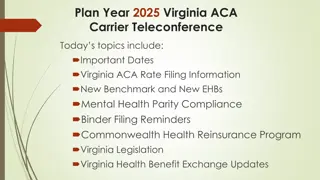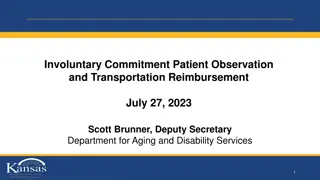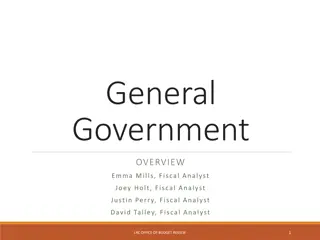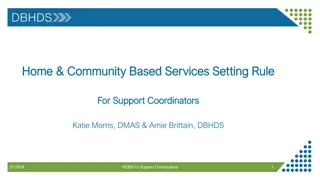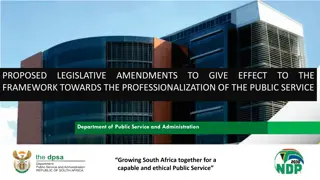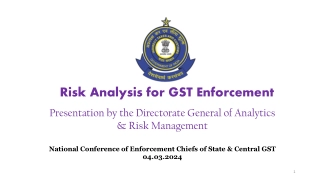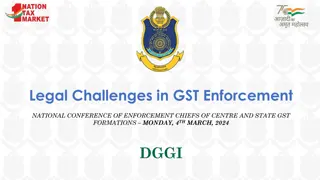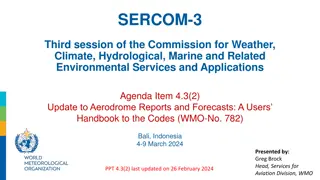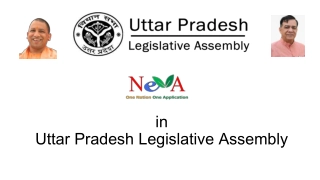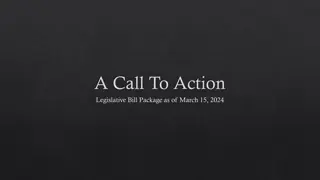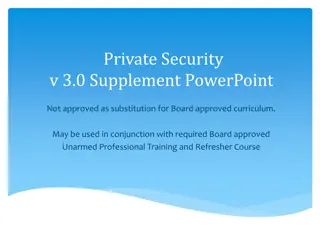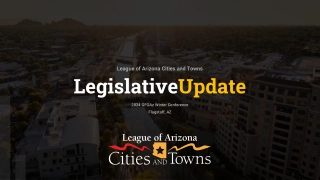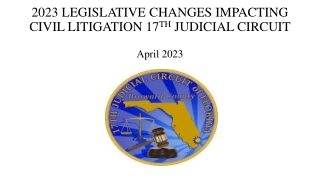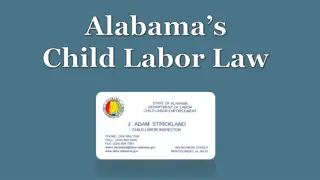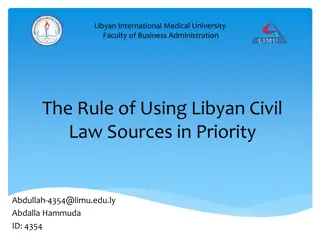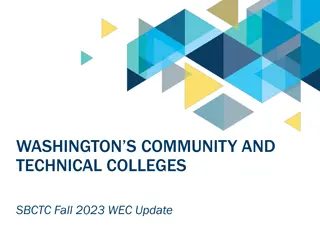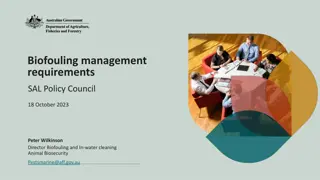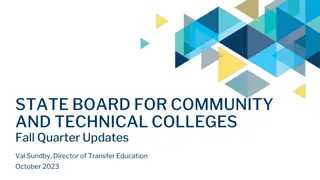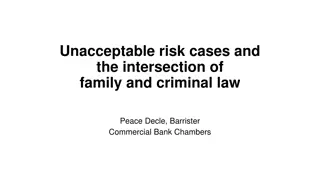2023 Virginia Legislative Update for Law Enforcement
This document provides a legislative update for Virginia law enforcement agencies regarding significant changes in criminal investigations, procedures, new and amended crimes, traffic offenses, and more from the 2023 General Assembly Regular Session. It highlights key topics and effective dates of legislation.
Download Presentation
Please find below an Image/Link to download the presentation.
The content on the website is provided AS IS for your information and personal use only. It may not be sold, licensed, or shared on other websites without obtaining consent from the author. Download presentation by click this link. If you encounter any issues during the download, it is possible that the publisher has removed the file from their server.
Presentation Transcript
CASC 2023 LEGISLATIVE UPDATE FOR VIRGINIA LAW ENFORCEMENT This document is provided for Law Enforcement by the Virginia Commonwealth s Attorneys Services Council pursuant to Va. Code 2.2-3705.7(29) for the training of state prosecutors and law-enforcement personnel.
Materials This PowerPoint attempts to identify the legislation from the 2023 General Assembly Regular Session that has the greatest impact on law enforcement and public safety. Consult the 2023 Legislative Update Master List outline for full listing of bills of interest. This presentation will NOT cover every bill.
Materials You must rely only upon the final language of the bill after passage. Slides summarize each bill, but you should read the actual law before acting. You can find the bill on the LIS website at: http://lis.virginia.gov/lis.htm.
Topics for this Presentation Criminal Investigations Criminal Procedure New and Amended Crimes and Offenses Traffic Offenses Marijuana and Hemp FOIA ECO and TDO Procedure Law Enforcement Procedural Guarantees and Requirements
Note: Effective Date of Legislation All legislation from the Session, unless otherwise noted in this presentation, is effective on July 1, 2023.
Ch. 170: Child Interviews Amends 63.2-1505 to state that if a local multidisciplinary team has determined during an investigation of a report of child abuse or neglect that an interview of the child by a child advocacy center recognized by the National Children's Alliance is needed and an interview with a recognized child advocacy center within the jurisdiction cannot be completed within 14 days, the local department of social services may facilitate the interview with a recognized child advocacy center located in another jurisdiction.
Ch. 487/488: APS Referrals Removes the requirement from 63.2-1605 that the adult protective services hotline immediately refer certain reports of alleged adult abuse, neglect, or exploitation to the appropriate local law-enforcement agency and removes the duty of local law-enforcement agencies to provide the adult protective services hotline with a preferred point of contact for such referrals. Bill retains the requirement for the local department of social services to immediately refer such reports to the appropriate local law-enforcement agency and the duty of local law-enforcement agencies to provide local departments of social services with a preferred point of contact for such referrals.
Ch. 359: Trafficking Minors 18.2-356.1: Creates a Class 5 felony for any person who offers money or other valuable thing to another for the purpose of purchasing or otherwise obtaining custody or control of a minor and thereafter does any substantial act in furtherance of such offer of purchase or obtaining custody or control of such minor. Bill also creates a Class 5 felony for any parent, legal guardian, or other person having custody or control of a minor who receives any money or other valuable thing for or on account of selling or otherwise transferring custody or control of such minor or who offers to sell or otherwise transfer custody or control of such minor. Bill creates exceptions for any person entering into a surrogacy contract, seeking to adopt a child or place his child for adoption pursuant to relevant law, or who is a person with a legitimate interest, as defined in 20-124.1, in such minor.
Ch. 564: Virginia Victims Fund (aka Criminal Injury Compensation Fund) Amends 19.2-368.10 and creates exception when law enforcement certifies that the victim was willing but did not due to a good faith belief of harm and no protection services were provided despite a request for such services by law enforcement. Current law allowed the Commission of the CICF to deny or reduce funds to victims who did not cooperate fully with law enforcement.
Ch. 680/681 Victims Testing Offender for STIs Provides that as soon as practicable following arrest, or following indictment, arrest by warrant, or service of a petition in the case of a juvenile, the attorney for the Commonwealth may request after consultation with any complaining witness, or shall request upon the request of the complaining witness, that any person charged with certain specified crimes be requested to submit to testing for sexually transmitted infections, as that term is defined in the bill. The bill provides that if the person charged refuses to submit to testing or the competency of the person to submit to testing is at issue, a court finding probable cause that the complaining witness was exposed to body fluids of the person charged in a manner that may transmit a sexually transmitted infection shall order such testing.
Ch. 746/784: Victim Notification about Plea Amends 19.2-11.01(A)(4)(d) to require an attorney for the Commonwealth to consult with a crime victim in a felony case to (i) inform the victim of the contents of a proposed plea agreement and (ii) obtain the victim's views about the disposition of the case. Bill provides that the victim shall be notified of any proceeding in which the plea agreement will be tendered to the court. Under current law, such consultation and notification is required only upon the victim's request.
NEW AND AMENDED CRIMES AND OFFENSES
Ch. 24: Drones Trespassing over Jails & Prisons Amends 18.2-121.3 to expand the Class 1 misdemeanor for Trespass by Drone to include: Using a drone to drop any item within the boundaries of state or local correctional facilities or juvenile correctional center. Using a drone to obtain any video or still image of an inmate or resident of state or local correctional facilities or juvenile correctional center.
Ch. 22/23: Anti-swatting 18.2-461.1 Creates a Class 1 misdemeanor when a false emergency communication results in an emergency response. Creates a Class 6 felony if the emergency response to a false emergency communication results in serious bodily injury to any person. Creates a Class 5 felony if the emergency response to a false emergency communication results in any person s death. The person convicted of such false emergency communication shall be liable for the reasonable expense in responding to such false emergency communication.
Ch. 200: Threats Against Healthcare Providers Removes the location element from 18.2-60 that specifies a health care provider must be in a hospital or in an emergency room on the premises of a clinic or other facility rendering emergency medical care from the crime of making an oral threat to kill or to do bodily injury to a health care provider.
Ch. 201/202: Update to Phone Threats Amends 18.2-429 to now state: B. Any person who, with or without intent to communicate but with intent to annoy, harass, hinder, or delay emergency personnel in the performance of their duties as such, causes a telephone to ring or other device to signal, which is owned or leased for the purpose of receiving communications by a public or private entity providing fire, police, or emergency medical services, and any person who knowingly permits the use of a telephone or other device under his control for such purpose, is guilty of a Class 1 misdemeanor.
Ch. 330: Venue for Vulnerable Adults Provides that, in addition to the county or city in which any act was performed in furtherance of the offense or the accused resided at the time of the offense, venue for the trial of an accused charged with Financial Exploitation of a Vulnerable Adult under 18.2-178.1 may be in any county or city in which: i. the vulnerable adult resides or resided at the time of the offense or ii. the vulnerable adult sustained a financial loss as a result of the offense.
Ch. 357 / 358: Organized Retail Theft 18.2-103.1 Creates a Class 3 felony (5-20 yrs & up to $100k) for anyone to conspire or act in concert with one or more people to steal retail merchandise with a value exceeding $5,000 in a 90-day period, with the intent to sell the stolen goods for profit. 18.2-103.1 Retail theft in more than one county or city may be aggregated. 18.2-103.1(D) Venue lies where any act in furtherance or where the person charged with the offense lived at the time of the offense. 18.2-103.1(E)
Ch. 357 / 358: Organized Retail Theft (cont.) Adds this new crime of Organized Retail Theft to the list of crimes denoted as racketeering activity . 18.2-51.3 Creates the Organized Retail Crime Fund to receive gifts, donations, grants, etc. for the purpose of awarding grants to Commonwealth s Attorneys and law enforcement agencies to investigate, indict and prosecute organized retail theft and associated fraud and property crimes. 2.2-511.2
Ch. 360: Locally-Created Curfews Enables the chief law-enforcement officer of a locality to enact a curfew under certain circumstances during a civil disturbance. Bill clarifies that such action in cities shall be in concurrence with the city manager and the mayor. Bill requires that such action specify the hours of the curfew and the geographic area to which the curfew applies and provide for various specified exceptions. The action authorizing the curfew shall provide for reasonable efforts to inform the public in advance of the curfew, which shall be valid for no more than 24 hours. Bill provides that such curfew shall not be extended or renewed unless by recorded vote of the local governing body or by judicial order. Bill provides that any violation is a Class 1 misdemeanor.
Ch. 379/380: Sexually Violent Predators Creates a Class 6 felony ( 37.2-912(C)) for any civilly committed sexually violent predator who tampers with or in any way attempts to circumvent the operation of his GPS equipment while on conditional release.
Ch. 381: Peeping by Drone Creates new subsection: 18.2-130.1(B) that prohibits any person from knowingly and intentionally causing an unmanned aircraft system to secretly or furtively peep, spy, or attempt to peep or spy into or through a window, door, or other aperture of any building, structure, or other enclosure occupied or intended for occupancy as a dwelling, whether or not such building, structure, or enclosure is permanently situated or transportable and whether or not such occupancy is permanent or temporary, without just cause, under circumstances that would violate the occupant's reasonable expectation of privacy. Class 1 Misdemeanor
Ch. 383/384 Weapon of Terrorism Fentanyl Includes any mixture or substance containing a detectable amount of fentanyl, including its isomers, esters, ethers, salts, and salts of isomers, as a weapon of terrorism for the purpose of defining terrorism offenses. Bill provides that any person who knowingly and intentionally manufactures or knowingly and intentionally distributes a weapon of terrorism when such person knows that such weapon of terrorism is, or contains, any mixture or substance containing a detectable amount of fentanyl is guilty of a Class 4 felony.
Ch. 396/397: Gang Participation Provides that the definition of predicate criminal act under 18.2-46.1 includes all violent felony offenses listed in subsection C of 17.2-805 for purposes of predicate criminal acts for street gangs. The law already includes offenses listed under subsection A of 19.2-297.1. The bill also increases various penalties for gang crimes in 18.2-46.2, 18.2-46.3:1 and 18.2-46.3:3.
Ch. 549: A&B of Public Transport Operator Makes it a Class 1 misdemeanor under 18.2-57 for a person to commit an assault and/or battery against another knowing or having reason to know that such individual is an operator of a vehicle operated by a public transportation service who is engaged in the performance of his duties. Bill requires the sentence of such person, upon conviction, to prohibit such person from entering or riding in any vehicle operated by the public transportation service that employed such operator for a period of not less than six months as a term and condition of such sentence. Class 1 misdemeanor to defy that ban and enter or ride again.
Ch. 568: Child Abuse/Neglect Amends the definition of Abused and neglected child in 16.2-228 and 63.2.100 to provide that allowing a child to engage in independent activities cannot, on that fact alone, be considered abused or neglected, provided that: i. the activities are appropriate for the child s age, maturity and physical & mental abilities, and ii. the lack of supervision isn t grossly negligent. States [s]uch independent activities include traveling to or from school or nearby locations by bicycle or on foot, playing outdoors, remaining at home for a reasonable period of time.
Ch. 604: Trespass - Person Lawfully In Charge Provides in 15.2-1717.1 that the maintenance code official of a locality is considered a person lawfully in charge of real property that has been declared a derelict building, unless the owner of such property objects, for the purpose of posting a sign or signs to prohibit any person to go upon the premises of such property without the authority of law.
Ch. 611: CCW - Switchblades and Stilettos Removes switchblade knives from the list of concealed weapons the carrying of which is prohibited in public. Adds stiletto knives to the list of concealed weapons the carrying of which is prohibited in public. New language in statute does not define stiletto.
Ch. 607/608: Racketeering Adds the new crime of Organized Retail Theft to the list of crimes denoted as racketeering activity . 18.2-51.3 Adds petit larceny to the list of offenses included in the definition of racketeering activity under 18.2-513. Also amends 18.2-514 to broaden the parties and the conduct that violates the racketeering prohibition to cover any person who is directed by an organizer, supervisor, or manager of an enterprise and to cover distribution of proceeds or anything else of value.
Ch. 612: Sexual Extortion Creates Class 5 Felony, 18.2-59.1, for sexual extortion when an offender maliciously threatens in writing to distribute nude photos or refuse to remove or delete the distributed nude photos unless the person engages in a sex act with that person and the victim does engage in a sex act with the offender as a result of the threats. Offense is punishable by 1-20 years and fine not more than $100k if an adult violates this section with a minor. Venue: County, city or town in which the communication was made or received.
Ch. 400: Abduction of a Minor Adds 18.2-47(C), which makes the abduction of a minor a Class 2 felony, unless such abduction is committed by the parent or a family or household member who has been ordered custody or visitation of the person abducted, for which there is a prescribed punishment. Under current law, abduction of any person is punishable as a Class 5 felony if there is no other prescribed punishment. The bill also makes an abduction committed by a family or household member who has been ordered custody or visitation of the person abducted punishable the same as an abduction committed by the parent of the person abducted.
Ch. 631: Naloxone Administration Allows anyone to possess and administer naloxone (or similar) with a hypodermic needle or syringe and removes requirement to have training. Also requires Department of Health to create the Opioid Impact Reduction Registry. Directs DOC to require that training in the administration of naloxone be provided to every inmate prior to release.
Ch. 709/710: Suffocation Amends 18.2-51.6 to add subsection (B): that any person who, without consent, impedes the blood circulation or respiration of another person by knowingly, intentionally, and unlawfully blocking or obstructing the airway of such person resulting in the wounding or bodily injury of such person is guilty of suffocation, a Class 6 felony.
Ch. 90/91: Sale, Purchase or Possession of a Used Catalytic Converter Amends 18.2-146 Creates a permissive inference that a person in possession of a catalytic converter that was removed from a car is in violation of felony tampering with an automobile under 18.2-146. Exceptions provided for: i. motor vehicle dealers, repair shops, and salvage yards, ii. scrap metal purchaser that has adhered to the required compliance provisions, and iii. someone who has proof the possession is a result of installing one in their registered vehicle.
Ch. 744 / 794: Hemp & Marijuana Limits the amount of tetrahydrocannabinol (THC) that can be included in a hemp product or industrial hemp extract to 0.3 percent and two milligrams per package. See 3.2-4112 and 3.2-5145.1. Limits the application of THC limits to retail sales and allows a hemp product or industrial hemp extract to contain more than two milligrams of THC if the product or extract contains an amount of cannabidiol (CBD) that is at least 25 times greater than the amount of THC. Bill creates certain packaging, labeling, and testing requirements for regulated hemp products and requires that topical hemp products bear a label stating that the product is not intended for human consumption.
Ch. 744 / 794: New Definition Per the Bill, the term "tetrahydrocannabinol" now means: any naturally occurring or synthetic tetrahydrocannabinol, including its salts, isomers, and salts of isomers whenever the existence of such salts, isomers, and salts of isomers is possible within the specific chemical designation and any preparation, mixture, or substance containing, or mixed or infused with, any detectable amount of tetrahydrocannabinol. For the purposes of this definition, "isomer" means the optical, position, and geometric isomers. See 3.2-4112, 18.2-247(F)&(G), 54.1-3401
Ch. 744/794: Civil Penalties 3.2-5145.2:1(B) Civil Penalties for : (a) manufacturing, selling, or offering for sale an industrial hemp extract or food containing an industrial hemp extract without a permit; (b) continuing to manufacture, sell, or offer for sale an industrial hemp extract or food containing an industrial hemp extract after revocation or suspension of such permit; (c) failing to disclose on a form prescribed by the Commissioner of the Virginia Department of Agriculture and Consumer Services that he intends to manufacture, sell, or offer for sale a substance intended to be consumed orally that contains an industrial hemp-derived cannabinoid; (d) manufacturing, selling, or offering for sale a food that contains more than 0.3 percent of THC or more than two milligrams of THC per package; (e) manufacturing, offering for sale, or selling in violation of food and drink laws or regulations a substance intended to be consumed orally that is advertised or labeled as containing an industrial hemp- derived cannabinoid; or (f) otherwise violating any provision of the Commonwealth's food and drink laws or regulations. Penalties are collected by Dept. of Agriculture
Ch. 744/794: Criminal Penalties 3.2-5145.2:1(B) Class 1 Misdemeanor for all of the previous items except (d): to wit: (a) manufacturing, selling, or offering for sale an industrial hemp extract or food containing an industrial hemp extract without a permit; (b) continuing to manufacture, sell, or offer for sale an industrial hemp extract or food containing an industrial hemp extract after revocation or suspension of such permit; (c) failing to disclose on a form prescribed by the Commissioner of the Virginia Department of Agriculture and Consumer Services that he intends to manufacture, sell, or offer for sale a substance intended to be consumed orally that contains an industrial hemp-derived cannabinoid; (e) manufacturing, offering for sale, or selling in violation of food and drink laws or regulations a substance intended to be consumed orally that is advertised or labeled as containing an industrial hemp-derived cannabinoid; or (f) otherwise violating any provision of the Commonwealth's food and drink laws or regulations. NO new penalty added for item (d) on previous list: manufacturing, selling, or offering for sale a food that contains more than 0.3 percent of THC or more than two milligrams of THC per package.
Ch. 744/794: Criminal Penalties The bill makes it unlawful under the Consumer Protection Act to 1. Sell or offer for sale any substance intended for human consumption that contains a synthetic derivative of THC or 2. Sell or offer for sale a topical hemp product that does not include a label stating that the product is not intended for human consumption.
Ch. 711: Restrictions on Marijuana Advertising Creates Class 1 misdemeanor for advertising marijuana products (incl. synthetic or synthetic derivative tetrahydrocannabinol) that are not legally sold in Virginia. 4.1- 1116 Class 4 misdemeanor for violations of 4.1-1405 (distance and zoning restriction on outdoor advertising) if the advertiser doesn t take corrective action within 30 days of notice by the Board.
Ch. 711: Marijuana Advertising (Cond) Bill also establishes numerous restrictions on marijuana advertisements, including provisions that prohibit advertisements from: i. targeting minors; being placed near schools, playgrounds, and certain other places; ii. being displayed at a sporting event or on a billboard; iii. being misleading, deceptive, or false; iv. referencing the intoxicating effects of marijuana; or v. promoting overconsumption or consumption by minors.
Review: 2022 Changes to Farm Use Tags Amended 46.2-665, 46.2-666, 46.2-670, 46.2-672, and 46.2-673 and adds 46.2- 684.2 Change would have required an owner or lessee of a vehicle claiming a farm use exemption from the registration, licensing, and decal requirements for a motor vehicle, trailer, or semitrailer to obtain a nontransferable permanent farm use placard from the Department of Motor Vehicles and to display the farm use placard on the vehicle at all times. Law required the applicant to provide specified information about the vehicle and its usage, pay a $15 fee, and certify that the vehicle is insured. Provisions of the bill requiring the owner or lessee of a farm vehicle to obtain and display a farm use placard had a delayed effective date of July 1, 2023.
Ch. 85/86: Farm Use Placards - 2023 Changes Delays from July 1, 2023, to July 1, 2024, the date by which vehicles claiming a farm use exemption are required to obtain a farm use placard from the Department of Motor Vehicles and display such placard at all times. The bill provides that the requirement to display a permanent Farm Use placard only applies to pickup or panel trucks and sport utility vehicles. Does not apply to Farm Use vehicles having a gross vehicle weight rating greater than 7,500 pounds or Farm Use trailers and semi-trailers. Does not apply to farm machinery or tractors. The bill adds to the authorized uses the use of Farm Use vehicle for disposing of incidental household refuse.
Ch. 85/86: Other 2023 Farm Use Changes The bill removes certain requirements on the application for a farm use placard, prohibits requesting additional information on such application, and prohibits disclosure of application information. The bill authorizes the use of a seasonal transportation vehicle for driving to a storage house, packing plant, or market regardless of distance. The bill clarifies that the exemption for transporting back to a farm essential food includes procuring a meal for a farmer or his employees and that such exemption applies while engaged in authorized farm vehicle uses. (A permanent placard may still be required.) The bill exempts vehicles required to obtain a farm use placard from the motor vehicle sales and use tax and authorizes localities to exempt such vehicles from personal property tax.
Ch. 117: Stopping for Pedestrians Amends 46.2-924 to require the driver of a vehicle on a highway approaching a pedestrian who is crossing such highway to stop when such pedestrian is within the driver's lane or within an adjacent lane and approaching the driver's lane. Currently, a driver is required to yield the right-of-way to such pedestrian by stopping and remaining stopped. Bill also provides that localities that are already authorized to install signs directing motor vehicles to yield the right-of-way to pedestrians crossing or attempting to cross a highway may also install signs directing motor vehicles to stop for such pedestrians.
Ch. 117: Stopping for Pedestrians - Language 46.2-924 Amended: A. The driver of any vehicle on a highway shall yield the right- of-way to stop when any pedestrian crossing such highway by stopping and remaining stopped is within the driver's lane or within an adjacent lane and approaching the driver's lane until such pedestrian has passed the lane in which the vehicle is stopped:





